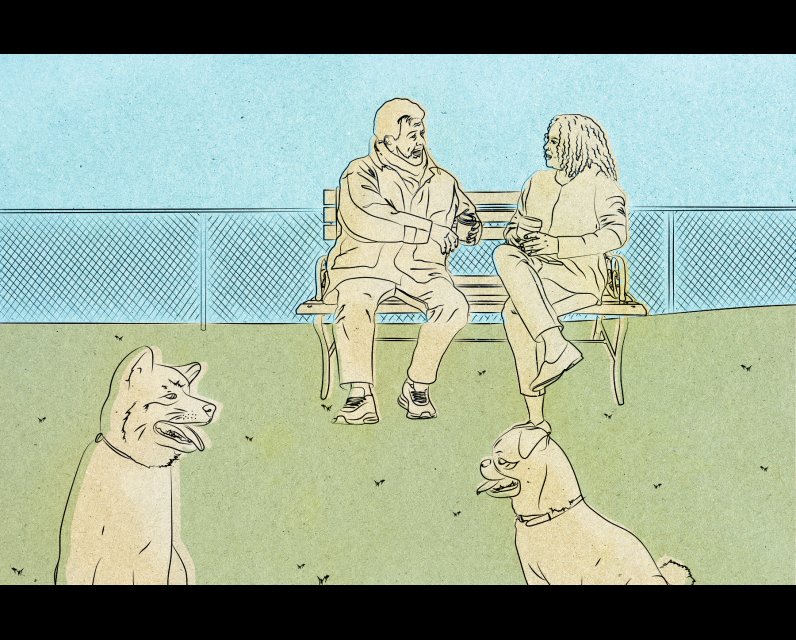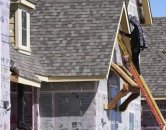Dog Parks Are the Third Space I Needed in These Polarizing Times

In the east Toronto neighbourhood I’ve called home for eighteen years, I’ve gotten used to the way people walk stoically past each other, careful not to interrupt their neighbours’ highly practised aloneness together. I have become very good at not smiling at strangers—because a smile might invite a greeting or, God forbid, a conversation.
In March, I did something that punctured that quiet. After a lifetime of wanting one, I adopted a dog. I almost felt the cartoon hearts in my eyes when a rescue agency volunteer showed me a picture of Hobbes, then a six-month-old chihuahua–pug from Texas. With little Hobbes, all six pounds of him, prancing happily by my side, it’s impossible to go just a few metres without seeing a smile crack on even the most hardened and hurried faces.
There was the woman with her walker who shuffled past me on the other side of the dog park fence, along with two boisterous boys, perhaps seven or eight years old, who elbowed each other out of the way as they frantically asked me, “CanIholdhimcanItakehisleashcanIwalkhimcanIcarryhimcanIpethim?” I met them at the park gate, let them in, showed them how to hold his leash, and had them take turns walking him along the inside perimeter of the fence. Hobbes, ever the patient, gracious guest of honour, let them, while the woman, whom I presumed to be the boys’ grandmother, looked on from the other side. “I had a dog also.” She nodded slowly to herself and cupped her hands about a foot apart to indicate his size. “Naida,” she added, tears forming in her eyes when she said the name.
I’ve had a carousel of conversations with perfect strangers about everything from the abysmal snow-clearing record this winter to the shock of a shooting that happened just a block from the dog park—and even the state of the media industry today. One young man gave me a fist bump when I told him I am a journalist. (These days, I’m shocked when disclosing my profession isn’t met with derision or cynicism.)
Even when I spoke to strangers before Hobbes, the discussions rarely lasted as long as they do now. On a cool day in late spring, I ran into a former colleague at the dog park. She told me she read and loved my last column for The Walrus and shared it widely with her family (the highest compliment). Her praise felt better than getting an Instagram comment or like on a post about the article. Here was a conversation that told me that people were actually reading my work, and thinking and talking about the ideas in it, instead of just sending a heart emoji for encouragement. This type of real-life feedback is rare for a writer who works alone at home.
Then there was the retired man who noticed the pouch I keep Hobbes’s treats in, an impulse buy from the time I visited Luxor and Aswan, with “Egypt” written in capital letters on top of the gold-threaded face of Cleopatra. “I went a long time ago,” he said as our dogs sniffed each other in a big grassy field at the park. He seemed surprised when I told him I am Egyptian. He told me he was Romanian. We spoke about our love of travel. (We bonded over the confusion we feel when we hear that our colleagues spend their precious time renovating their basements instead of exploring the world.) He beamed with pride when he talked about his education and career. I told him I am a journalist and that I’d spent the past two years writing and speaking about the coverage of Israel and Palestine. I braced for his reaction, knowing intimately how the mention of either of those countries—let alone both of them—could end a conversation before it even began.
I wasn’t entirely wrong: for the next nearly forty-five minutes, we engaged in a lively, at times tense, conversation. He’d say: “If I were the Palestinians, I would simply stop the fighting. Israel is more powerful.” He referenced Russia’s invasion of Ukraine to underscore the intensity of competing national claims. “Many people believe this land is theirs; it is not just for Palestinians.” He expressed annoyance about what he saw as the lack of education of many people who are ignorant of the region’s nuances and history. “Anyone who cannot name the countries directly surrounding Israel should not be speaking about it,” he added.
I couldn’t remember the last time I’d had this kind of in-person discussion with someone whose background was so different from mine. Whatever tension hung between our exchange dissipated as we looked down at the dogs playing at our feet. We occasionally paused our geopolitical sparring to untangle their leashes. I offered: “I can tell you’re very proud of your education, and you really value it.” He said he was. Then I said: “What if I told you that there was not a single university left in Gaza right now? Israel has destroyed every single one of them.” For the first time in our long exchange, he was quiet, pensive. Or perhaps just worn out. Our dogs seemed tired too. Then he said, tugging gently at his leash: “You’ve given me a lot to think about. We will continue talking about it next time.” Politeness or persuasion, I’ll never know.
What I do know is that Hobbes has granted me access to a new, beautiful third space. In a city packed with harried strangers, someone with a dog, to me, is a green flag. If nothing else, I know they have the shared experience of knowing, loving, and taking care of a pet, with all of its sweetness and stresses (and vet bills). Everything that flows from that starting point is infused with a goodwill and a kinship that feel like they have ceased to exist. Who amongst us hasn’t felt how easily conversations these days can fray and fall apart at the mention of vaccines, of Trump, especially in the cacophony of online chaos?
There’s an irony that, in real life, it’s these animals we’ve come to love so much who create a civility and kindness we rarely have energy for with each other. The pandemic all but wiped out the many loose relationships we kept—the barista, the crossing guard, the nail technician at the salon. Hobbes and his canine friends have created a whole new network of fans, friends, and fleeting joys.
I’m under no illusion that dogs can save us from ourselves, but at the very least, for brief moments at a time, they help us listen and be heard. Dogs allow for an intimacy between strangers that I think many of us have lost the ability to share; in even the shortest conversations, other dog owners have told me of cancer diagnoses or how pregnancy changed them. And just like that, there’s empathy again.
Hobbes has been napping in my lap on and off as I type this, and I can’t help but think that he has brought a romance to my life, the kind Maya Angelou spoke of when she said: “Our community without romance risks being brutish and crass and superficial and brittle and cruel and even murderous without romance. And I don’t mean just ‘romantic romance.’ I don’t mean just ‘erotic romance.’ I mean ‘agape romance.’ . . . I mean the romance that allows us to soften our voices when we see each other.”
I see that everywhere now. “Careful, there’s a skunk down that way,” my neighbour across the street said to me the other night while we were both on our nightly walk with our dogs—hers a goofy, happy golden retriever—before bed. It’s the first time we’ve ever addressed each other, despite living nearly face to face for years.
The post Dog Parks Are the Third Space I Needed in These Polarizing Times first appeared on The Walrus.

Comments
Be the first to comment